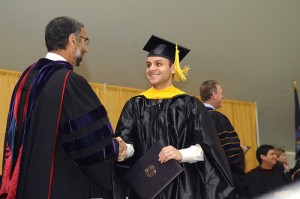Cathy Davidson, author of Now You See It: How the Brain Science of Attention Will Transform the Way We Live, Work, and Learn (Viking), predicts that “65 percent of today’s grade-school kids may end up doing work that hasn’t been invented yet."
She says for this generation of grade-school kids, it’s time to redesign American education. "It’s time to survey our lives and figure out what works, what doesn’t, and how we can make real and practical improvements in our schools, our workplace, our every day lives,” Davidson said in a recent interview with MindShift.
For their part, some universities are adapting to current trends by trying to bolster their science, technology, and medical programs – but often at the expense of their liberal arts programs. Across the country, universities are paring back on the humanities. In Florida, for example, the business community has "clamored for a de-emphasis on liberal arts degrees such as philosophy and history toward degrees like engineering and computer science to keep pace with demand," according to an article in the Sunshine State News. "Businesses recruiting for these high-paid, high-skilled jobs say they have to look out of state to fill positions, and Florida is ranked 'average' compared to other states in student preparation for science and math careers," the article states.
But college counselors are telling liberal arts students to focus on “transferable skills” like verbal communication, analytical and teamwork skills. They say these skills will always be in demand – now and in the future.
“Companies want to mold (students) in their own corporate culture,” says Marcie Kirk-Holland, project manager at the U.C. Davis Internship and Career Center. “So (companies) are looking for people that have these basic abilities … and students have ideally developed that during their time in college.”
For an increasing number of students, they’re open to falling into a job that is not directly in line with what they studied in college, so long as they are making a difference in their life and in the lives of others.
“I want to do something that is worth doing,” says Harrison Noah, a history major at U.C. Davis. “If I can die knowing that my environment or my world was slightly improved because of my presence, I’ll call that a win.”


